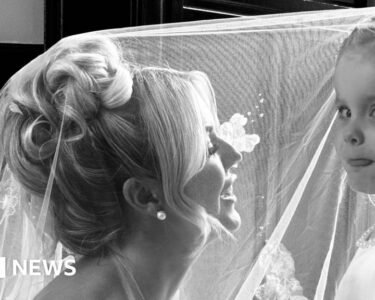In January, Tessa Tookes tried on her dream wedding dress at a bridal boutique in Ontario. When the store employees told her she would have to pay $200 for the bra cups of the gown to match her skin color, her heart sank. The beige cups that had already been built into the dress, however, were free. Ivory cups were also a free option.
Ms. Tookes, who is Black, loved the dress so much that she put down a deposit for half the price of the gown. But when she returned home, she had time to process what had happened.
“When the dust settled a week later, I was like, I probably don’t want to wear this dress anymore,” Ms. Tookes, 28, said. “It just feels kind of icky and wrong.”
When her fiancé, Joey Kirchner, 34, learned about the incident, he expressed his outrage on their joint TikTok account, in a video that has received more than 4.5 million views and 12,000 comments. “So you’re telling me that it’s free to be white?” Mr. Kirchner, an actor and model, said in the video.
In an interview, Mr. Kirchner, who is white, added, “Why is the standard ‘nude’ a ‘nude’ that would match my skin tone?”
After the couple posted the video, a representative from the boutique messaged them and offered the brown cups for free, said Ms. Tookes, a model and people operations specialist. But she believed that the boutique did not take accountability for how the experience made her feel.
A few hours later, as the video was receiving attention, the representative reached out again. This time, the boutique offered the entire dress free. “I think they were getting nervous that we would expose their name,” Ms. Tookes said. (The couple did not accept the offer or name the boutique.)
Since then, many designers have reached out to the couple, advertising their inclusive policies. Last week, Ms. Tookes visited a few stores in New York and even found her new wedding dress.
Ms. Tookes’s experience at the boutique in Ontario is one shared by many women of color shopping for wedding dresses. For her wedding in May 2023, Ashley Oliver Thomas paid $150 for the bra cups of her ceremony gown to be dyed to match her skin color. “It almost sounds like it’s a ‘Black tax,’ or a ‘person of color tax,’” she said.
Ms. Thomas, 36, a diversity director who lives in Lexington, Ky., added that the fabric of the dresses she had seen in the stores she went to matched lighter skin tones. She had to do a lot of visualizing to imagine what they would look like after the alterations were done.
“The terms ‘sheer’ and ‘nude’ mean ‘taupe’ or ‘beige,’” Ms. Thomas said. “I am a darker-skinned Black woman. I’m more of a ‘chestnut,’ ‘chocolate.’”
Ms. Thomas added that she felt like she was burdened to ask questions about whether designers offer the option to dye the lace or the mesh of a gown, and about the corresponding costs. “Having those conversations is extra labor for brides of color,” Ms. Thomas said.
“Usually the bridal market caters to white, young girls,” said Rachel Sojo, a bridal stylist in Chicago. That’s why she prefers to work with brands like Esé Azénabor and boutiques like Belle Atelier, professionals who cater to brides of all ethnicities.
That’s also why Ms. Thomas felt she needed to work with a Black designer for her reception outfit: an illusion dress, a style made with a sheer, tulle base that is meant to blend in with the bride’s skin. She went with Brides by Nona, an atelier in Marietta, Ga., that offers different shades — and no additional charges. “That was a big relief,” Ms. Thomas said.
Gbemi Okunlola, the founder of the fashion brand Alonuko, is particularly known for her illusion gowns. After shopping with her sister for her wedding in 2014, Ms. Okunlola started her own bridal collection and designed a sheer tulle for Black women.
“Every part of the dress that would work for a white bride, we make it so that it would work for us,” said Ms. Okunlola, who is Black. That includes zippers, hanging loops and threads on the dress. And 25 color options. “It’s not a simple process,” she said, but one that’s a priority for her.
“It does cost a lot more to provide this many options,” Ms. Okunlola said. “But it’s almost like brands are penalizing people for being a different skin color to what their default is.”
After posting on TikTok, Ms. Tookes said she had noticed some changes. She saw that the website of the designer that had charged for the cups updated its language from “brown cups available separately” to “all cups available.”
“A small change,” Ms. Tookes said, “but one that definitely has an impact.”




